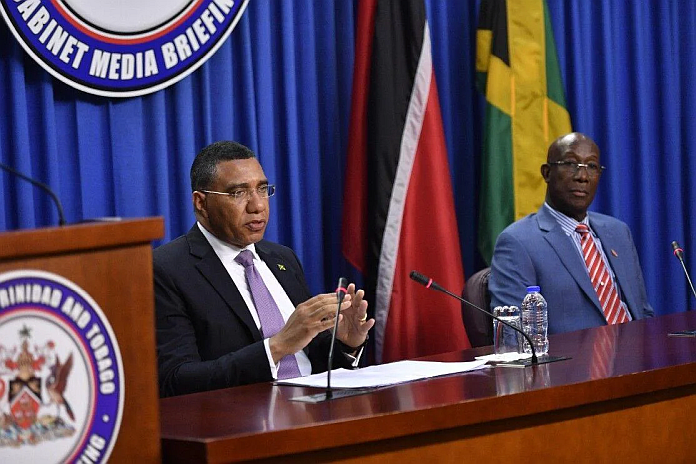By Tony Deyal
When the West Indies Federation failed, Guyana took a shot at being the first country to become independent but this was shot down by the British. Of the two countries anxiously waiting in the wings, Jamaica was the first and quickly jumped the gun on Trinidad and Tobago (T&T) or, as the sports commentators would say, “bolted” into the lead. Jamaica became an independent country on August 6, 1962, while T&T had to wait until August 31st. While Jamaica had Bustamante, bauxite and yellow gold, T&T had Eric Williams, natural gas and black gold. What they both had in common was crime. Worse, regardless of the country, it had only just Big Gun.
When Jamaica gained independence in 1962, the murder rate was 3.9 per 100,000 inhabitants, one of the lowest in the world. In 2005, Jamaica had 1,674 murders, a rate of 58 per 100,000 people, the highest in the world. In T&T, during my school days, the police did not carry guns, and the majority of “bad johns”, or men “willing to use violence” initially had sticks, knives, knuckle dusters and cutlasses. By 1959, this was rapidly changing for the worse. Calypsonian, the Mighty Sparrow, sang “The Gunslingers” which started with, “Sparrow selling guns nowadays/ That’s what really pays” and then went on to describe the transition, “Nearly every young man is a gunslinger/ With his razor and his steel knuckle on his finger/ Don’t mind they dress in suit and bow tie/ All of them looking for guns to buy.”
The statistics tell the rest of the story. In 1998, there were 7.6 murders per 100,000 in Trinidad and Tobago. In 2002 there were 13.6 per 100,000, and by 2005, the rate was 30.7 per 100,000. Less than Jamaica but clearly heading for higher heights.
Interestingly, the killing was not limited to the criminals including, or especially, the police. In 2009, a Trinidad newspaper headlined: “Funeral homes make a killing”. This went way beyond the rubric of the National Rifle Association (NRA) of the US that “guns don’t kill people, but people kill people”. Actually, in addition to the undertakers, others making a killing from the killings are gravediggers, hearse drivers, flower-shop owners, tailors, and last, but certainly not least, the gun sources and resources throughout the Caribbean and elsewhere including importers, exporters, sellers, renters, makers, go-betweens and other facilitators, especially the customs and police at all levels in every Caribbean country. Earlier this year, I did a quick check of “Police Officer Charged…” for various crimes.

Under Jamaica, I got 12,200,000 in .48 seconds. Barbados came up with 1.66 million in 46 seconds and Trinidad with 3.6 million. In Trinidad, police killings being probed by the police complaints authority reached 106 cases in March this year. According to the British paper, “The Guardian”, using statistics from Amnesty and Indecom (the Independent Commission of Investigations) the police watchdog body, found that since 2000, members of the Jamaican constabulary force (JCF) have allegedly killed 3,000 people.
Then I looked in the World Population Review for the latest figures for “Crime Rate by Country.” Heading the list at 83.76 deaths per 100,000 people was Venezuela, one of the major suppliers of guns to T&T. Number six on the list is T&T itself at 71.63 and, for what is the first time, above Jamaica which, at number 10, has gone down to 67.42. The review explained that Trinidad has the sixth-highest crime rate in the world because of bureaucratic resistance to change, negative influences of gangs, drugs, economic recession and an overburdened legal system. It added: “There is a great demand for illegal weapons as well, which drug trafficking and gang-related activities fuel. Trinidad and Tobago has a Level 2 travel advisory, meaning that travelers should exercise increased caution. Visitors are typically victims of pickpocketing, assault, theft, and fraud.”
For the first time, Trinidad and Tobago has “beaten” Jamaica in the murder stakes. However, the review sees Jamaica’s ongoing problems as being plagued by government corruption, gang activity and high levels of violent crime including sexual assault. In 2017, just five years ago, the countries with the highest homicide rates included Jamaica at second place, Saint Vincent and the Grenadines at seventh, and St Kitts and Nevis at ninth. T&T was not in the top ten.
This is why one of my US-based friends called me when he saw that the prime minister of Jamaica had come to T&T for Independence. “Tony boy,” he said with a laugh, “I know why he reach in Trinidad. He come to take back his country’s place in the world record. He really must be upset that T&T is now higher than his country.” I was aghast and upset. “How can you even think of something like that?” I asked. “You know that thousands of guns sold in the US are coming to Jamaica. Some come through Haiti. Even Barbados is worried by a spike in gun-related murders.” He asked, “You don’t think I know that? You don’t think I am worried about my family in Jamaica and my friends like you in Trinidad where guns and people come from Venezuela which now heads the world in murders?”
I told him that I was glad to see he was concerned and that the Jamaican prime minister had made some very important points including that Jamaica is facing a challenge that illegal guns are coming through legal ports and that “speaks to a high level of possible corruption in the court and customs system.” He agreed, “I understand that. They have to have guards to guard the guards and then more guards to guard the guards guarding the guards. But the prime minister as head of government should know that the major cause of the murders in Jamaica, like the guns coming in, is that it is plagued by government corruption and he has not said anything at all or, worse, not done anything significant about that. Trinidad is the same.”
He was right and I told him so. My view was that the T&T government after seven years in power is still blaming the opposition it replaced in office and the opposition is still not on the wavelength of the population.
My friend had the last word. “You see they saying that crime, especially murder, is a public health issue? Where the health they get that from? What do they want to do? Instead of building a jail, they will build a hospital? Instead of putting the police criminals and murderers in a cell, they will put them in the Mad House?”
Before I could reply and tell him that it is not the criminals who have the health problems but the people who suffer at their hands, he added, “Look. I knew that the whole thing was a smoke screen. Even the newspapers see it because they said that the two prime ministers had a joint press conference.”
*Tony Deyal was last seen looking at the two very smug, swanky and well-dressed big-guns of Caribbean politics at a news conference and thinking that crime does not pay…as well as politics.





